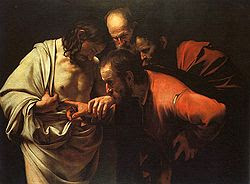Sunday Scripture: http://www.usccb.org/nab/050111.shtml
Acts 2: 42-47
1 Pt 1: 3-9
John 20: 19-31
“Peace be with you” greets the Celebrant – “And also with you, “answers the assembly. So goes the mini-ritual called the sign of peace, wedged between the “Our Father” and the “Lamb of God” during our Eucharist gatherings. Its intent is more profound, I believe, than most realize. While repeated liturgy bears the potential danger of becoming routine, and we all must never forget to keep it fresh, there was nothing ordinary in that same greeting of Jesus to his bewildered, frightened, awe struck, astonished, and out right incredulous Apostles in the Gospel this weekend. “Peace be with you,” he greets these men.
They hide in fear of the Jewish leaders – understandable considering the events just two days before: Would they be next? They may be one with these leaders in culture and heritage but they are far apart in belief. Here, at the beginning, faith in Jesus becomes a sign of contradiction; a call to conviction. Not a comfortable position to be in for sure.
In the midst of that fear and confusion, the risen Christ comes. He did far more than offer a 30 second handshake or embrace. He “breathed on them” the Holy Spirit. I would love to have been a fly on the wall. To see the reaction of the disciples, to gaze into their faces, to study their posture as the one who was violently killed, very much dead in his tomb, now stands before them in glory and peace (Shalom). Spiritual yet material as he shows them the wounds of his passion.
Here in their hide-away there is fear but Christ brings a presence, a fullness that brings the call for reconciliation: “Whose sins you forgive are forgiven them . . .” We can imagine that Peter and the others may have been contemplating some sort of retaliation in response to Jesus’ scandalous murder. The last thing they needed to see was a reminder of that hatred foisted on their Master and Lord – the wounds of his suffering. Only vengeance will bring certain justice.
But, Christ invites them to respond to hatred with love; injustice with mercy. Only then would they find true peace within their own hearts and have the clarity of mind to understand the full mission of Christ, which ultimately became their own. Yet, one of their own was missing to hear this challenge – Thomas. Once he hears their story, he demands proof. I wonder if I might have done the same. It was too fantastic, too impossible to believe but might this be true? Still, “If you say he’s alive, show me!”
Then, in a moment of great humility before Thomas, Christ invites him to touch those signs of his love. Only then was Thomas’ skepticism healed to become faith. But faith is more than the material – faith is like the risen Christ: both body and spirit joined in glory. Thomas too hears Jesus’ greeting of “Peace.”
Easter is this great season of faith. Faith that demands a personal encounter with Christ. Our Protestant brethren are eager to ask, “Have you accepted Jesus as your personal Savior?” We in the Catholic Christian tradition believe that – he is our personal Savior but he is also Savior to all humankind, even to those who do not yet believe in Him. But it is the personal dimension that is essential. We can hide in the collective comfort of Community life and hope that by some process of osmosis faith itself will be absorbed in to us. But, sooner of later we must face the personal dimension of our faith.
The Community inspires us, Community life supports us, the Community of the Church (our Parish life) brings us comfort and hope. But when we stand before Christ in the Eucharist and hear, “Body of Christ” and “Blood of Christ” we are asked to make a decision that is tied to our brothers and sisters but is as much individual. Do YOU believe this to be Christ’s Body – your Savior who brings YOU life – his life?
This Sunday we mark the Divine Mercy of the Lord Jesus and the joy of the now Blessed John Paul II. While Christ’s mercy is available to all who seek it, we must do so as individuals; expressing our personal trust and loyalty to Christ. We must seek it out in our desire for conversion and forgiveness through the Sacrament of Reconciliation.
There may be a little or a lot of Thomas in each one of us. But once he was granted his own personal experience of the Lord, he came to believe for he himself saw, touched, and heard the voice of Christ in his life. Thomas, along with the others gathered, could then fulfill Jesus’ mission, “As the Father has sent me, so I send you.”
May the example of Blessed John Paul II be one more personal encounter with the Lord.
